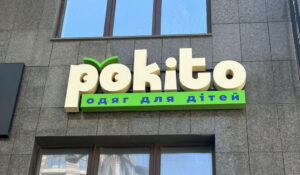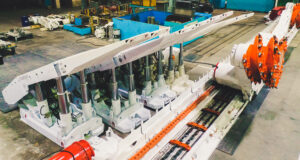
86,795 newborns in Ukraine and 249,002 deaths – these are the statistics of life and death for the first six months of 2025 published by the Ministry of Justice. Currently, there are 3 deaths per baby, and this situation has remained unchanged over the past 5 years. Most babies are born in the capital, and most often die in Dnipropetrovs’k region.
86,795 babies were born in the last six months. It can be noted that the birth rate has stabilized during the war, as it is almost the same as in the same period last year. Back then, 87,655 little citizens were born in the first half of the year.
However, the overall trend is disappointing: the birth rate has decreased by 2.2 times in ten years. While in 2016, on average, 32 thousand babies were born per month, this year only 14 thousand were born.
Traditionally, most babies are born in Kyiv – 9,947 or 12% of the total number of newborns. Lviv region follows with 8,282 (10%) babies. Dnipropetrovs’k region rounds out the top three with 6,670 (8%).
In some regions of the country, despite the war, there is even a small increase in the birth rate. Kyiv region is the leader with +6% over the year, followed by Lviv region with +5%, and Volyn with +6%.
In general, a small increase is observed in 7 regions of the country.
At the same time, fewer children are expected to be born in regions close to the front line. In Donetsk region, the birth rate has almost halved over the year (-47%), in Kherson region – by 11%, and in Chernihiv region – by 10%.
Traditionally, most boys are born – 51%.
At the same time, 249,002 people died in the first half of the year in Ukraine. The situation has hardly changed over the year. Currently, there are three deaths per newborn. This figure has remained unchanged over the past 5 years. Thus, the country’s population is decreasing by more than 300 thousand annually.
For comparison, in 2016, there were 2 deaths per 1 baby.
Every ninth person in Ukraine dies in Dnipropetrovska oblast – 27,120 deaths, which is consistently the highest rate in Ukraine. The anti-leaders are Kyiv with 18,114 deaths and Kharkiv region with 17,694 deaths.
https://opendatabot.ua/analytics/birth-death-2025




Alliance Novobud has been recognized as one of the best in the capital’s suburbs segment according to the annual rating of developers compiled by the Minfin portal. According to the results of 2024, the developer confidently took the 3rd place among the developers of the suburbs of Kyiv region, proving stability, reliability and high growth rate even in a turbulent market.
This year, the editors have slightly updated the rating methodology, adding several important criteria that allow potential buyers and investors to gain a deeper understanding of the quality of projects and the reliability of developers. Alliance Novobud continues to keep the bar high, demonstrating stable development and responsible attitude to obligations to customers every year.
“Suburban developers have an advantage – today they can build faster and more. But the requirements for them are also growing. Now it is not enough to just build square meters. The winner is the one who creates a high-quality and well-thought-out living space,” emphasized Iryna Mikhalova, CMO of Alliance Novobud.
“Alliance Novobud builds not just square meters, but above all, meaningful spaces for living. We thank our customers and partners for their trust! There are even more important steps and new projects ahead.

Foreign Ministers of Uzbekistan, Afghanistan and Pakistan Bakhtiyor Saidov, Amir Khan Muttaki and Ishaq Dar signed a trilateral framework agreement on the development of a feasibility study for the Trans-Afghanistan Railway project during a meeting in Kabul on Thursday.
“We have signed a trilateral framework agreement on the development of a feasibility study for the Trans-Afghanistan-Pakistan Railway project, which is of strategic importance for the whole of Eurasia,” the Uzbek Foreign Minister said in his telegram channel.
He noted that this transportation corridor will improve trade, support Afghanistan’s economic recovery, and open new routes to world markets through southern ports.
According to Saidov, during the meeting, the Uzbek side reaffirmed its commitment to strengthening trade ties, expanding cooperation in agriculture, pharmaceuticals, textiles and construction, as well as increasing the capacity of the Termez International Trade Center (opened in Uzbekistan near the Afghan border).
As reported, in February 2021, representatives of Uzbekistan, Afghanistan, and Pakistan signed a joint action plan for the construction of the Mazar-e-Sharif-Kabul-Peshawar railway with a length of 573 kilometers and a transit potential of up to 20 million tons of cargo per year following talks in Tashkent.
The World Bank, the Asian Development Bank, the European Bank for Reconstruction and Development, the European Investment Bank, the Islamic Development Bank, the Asian Infrastructure Investment Bank, and the U.S. International Development Finance Corporation (DFC) have expressed interest in financing the project.
In April 2024, during Uzbek President Shavkat Mirziyoyev’s visit to Moscow, a preliminary agreement was reached on Russia’s participation in the project. The volume of Russian cargo transportation along the projected route can be estimated at 8-15 million tons annually.
According to the Ministry of Transport of Uzbekistan, the construction of the Trans-Afghan railway line will take at least 5 years, with a preliminary cost of $4.8 billion.
AFGHANISTAN, CONSTRUCTION, PAKISTAN, Trans-Afghan railroad, UZBEKISTAN

A children’s store of eco-brands Pokito, with a focus on ages 1 to 10, will open in Ocean Mall, the company’s press service reports.
“Pokito started its operations in 2023 with a clear mission: to offer Ukrainian parents high-quality, environmentally friendly and aesthetically pleasing clothes for children under 10 years old. We offer solutions that meet the daily challenges of an active childhood: comfort, practicality, durability, safe materials and modern design,” said Pokito founder Iryna Zueva.
The assortment of the 80-square-meter store, which will be located on the entertainment floor of Ocean Mall, will include proven European and domestic brands that have proven themselves to be responsible in production, high quality standards and child care. The presented children’s clothing, footwear and related products are united by one idea – practicality, quality and care for the child’s comfort. The store’s portfolio currently includes 15 brands. Among the bestsellers are Spanish Boboli and Cóndor, Danish Liewood and Konges Sløjd, British Mimi & Lula, etc.
The main requirements for manufacturers are a proven reputation for high quality materials, responsible production and environmental standards, safe composition and certificates confirming this. Ukrainian brands already represented include Ukrglamour – embroidered shirts (Lutsk), Elf-Kids – hats (Odesa).
“We want the item to be worn, not to lose its appearance after two or three wash cycles, and to make parents happy that they made the right choice by choosing Pokito products. This creates trust and ensures that our customers will come back to us again,” Zueva said.
As for foreign brands, she emphasized that they choose those that have already gained favor abroad due to their properties, but have not yet gained popularity in the Ukrainian market, which makes it possible to make a unique shopping offer to domestic customers.
Ocean Mall is a retail resort format shopping center. The total area is 300 thousand square meters, with a parking lot for 4 thousand cars. The mall will combine 800 shops and 50 restaurants. Among the largest tenants are Silpo grocery supermarket, flagship stores of the world’s largest retailers in the segments of fashion, sports, and home furnishings. More than 30 thousand square meters in Ocean Mall are dedicated to entertainment, including the Galaxy amusement park for the whole family and a seven-screen multiplex cinema.

DTEK Energy’s machine builders have overhauled the EL160LS roadheader for the first time and handed it over to DTEK Shakhtoupravlenie Dniprovske, reports Corum Group.
“This is a new type of equipment for us, so the project was a real challenge. However, everything was completed on time and in accordance with the technical requirements,” the company said on its Facebook page.
According to the report, the machine received new explosion-proof electrical equipment of its own design, certified according to Ukrainian standards.
The machine has a 300-liter bucket and a 55 kW engine. It weighs 9.5 tons, has a boom swing of ±30°, and operates on slopes of up to 22°.
According to open source information, the EL160LS soil scraper is manufactured by the German company Hazemag. It is designed to level the soil of a mine workings, as well as to load loosened rock mass onto a belt or scraper conveyor.
Corum Group is a leading manufacturer of mining equipment in Ukraine and a part of DTEK Energy, an operating company responsible for coal mining and electricity generation within Rinat Akhmetov’s DTEK energy holding. DTEK Energy’s machine-building assets include Druzhkovka Machine-Building Plant (relocated to Dnipro), Kharkiv-based Svet Shakhtyora Plant and Pershotravensk Machine-Building Plant.